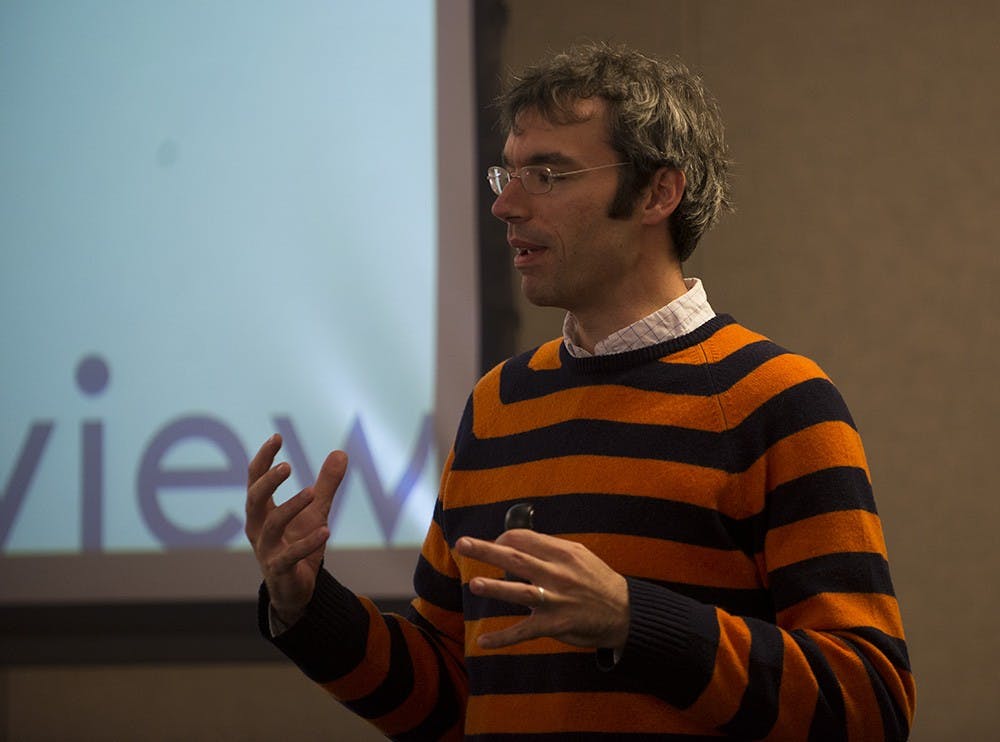The University Office of Sustainability held a TED-inspired talk titled “Hoos Talking Green” Friday in connection with the University’s Sustainability Days. The event featured six speakers from the University — Medicine Prof. Matthew Trowbridge, Urban and Environmental Planning Prof. Time Beatley, Computer Science Prof. Kamin Whitehouse, Environmental Science Prof. Deborah Lawrence, Law Prof. Jonathan Cannon and Economics Prof. William Shobe.
The speakers had seven minutes and fourteen slides each to present about sustainability.
“The Office for Sustainability devised ... a way of bringing together various faculty expertise we dont always hear about,” University Sustainability Director Andrea Trimble said. “We sometimes hear piecemeal in the news ... but we wanted to bring together and have them ... explore intersections of economics and law and science and design all together.”
Shobe discussed “cross-generational consumption trade-offs” — how consumption decisions today can have an impact on future generations due to resource depletion and pollution.
“Economists have come up with the Golden Rule of sustainability,” Shobe said. “If you take a measure of scarcity of a given environmental resource that you’re using up and … invest it back into [capital and human knowledge investments], then theory tells us for a lot of environmental resources we can make them last forever … by learning how to use less and less and less for more and more and more.”
Shobe stressed the importance of investing in sustainability efforts to promote these types of gains.
“Economists view of sustainability mathematics: Get the price right … then you invest in brain power and hopefully that will help us result in devising sustainable policies,” Shobe said.
Cannon spoke on the Supreme Court’s role in the green movement, and growing polarization between environmentalists and their critics.
In the 1970s on Earth Day, “folks of all persuasions came together to celebrate the earth, to express concern about its future,” Cannon said. “From that public outpouring and the public sentiment ... there were a whole string of new environmental laws that were enacted: the Clean Air Act, Clean Water Act … and pesticide regulation.”
Cannon said there was a much greater consensus in past years that action needed to be taken to protect the environment.
“The statutes were adopted by large bipartisan majorities,” Cannon said. “It was a part of the political landscape that all candidates for political office were calling themselves environmentalists.”
Cannon said that today the consensus has faded.
“That is a huge impediment in solving huge environmental problems,” he said.
Cannon said that environmentalists typically value community initiatives and are not consumed with creating wealth, while the business community typically values the opposite.
“Other folks are not accepting the science not because they know anything about the science ... but because they don't like the solutions that are suggested by the scientific findings,” Cannon said.
Beatley presented on his Biophilic Cities Project, saying “the basic idea is that we believe cities can be natureful.”
“[Because of an] innately emotional affiliation of human beings to other living organisms in nature ... we are hardwired to meet that connection with the natural world,” Beatley said about biophilia.
He said embracing nature in an urban setting can lead to improvements of quality of life.
“We are happier, more productive, healthier, lead more meaningful lives when we all have nature all around us,” Beatley said.
Beatley said biophilic cities can take many forms.
“It means different things in different places,” he said. ”[They are] cities that adopt many means to foster deep connections to the natural world. The idea of connections and connectedness is really important.”
Beatley said this ideal can be accomplished through smart design and planning.







